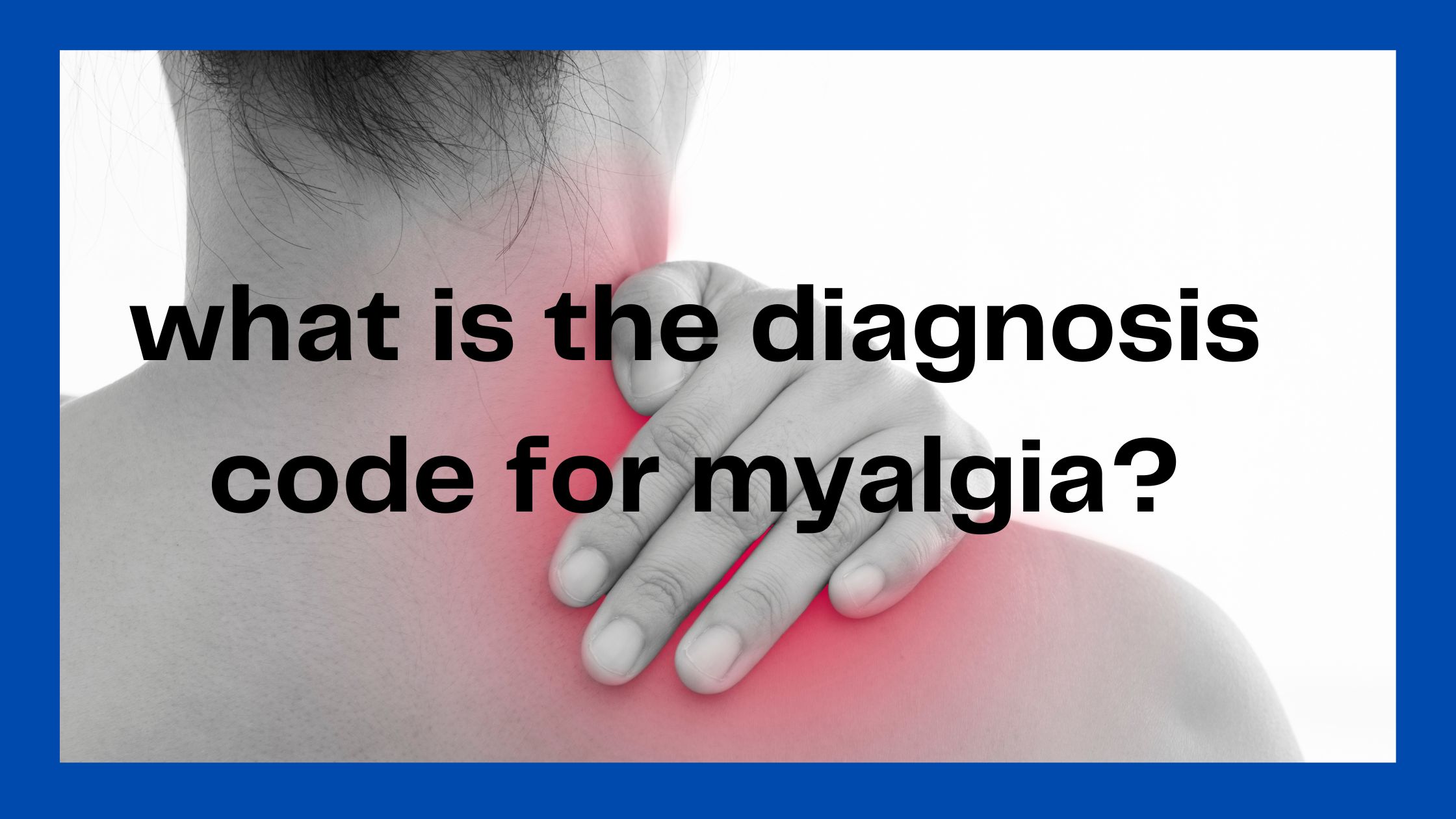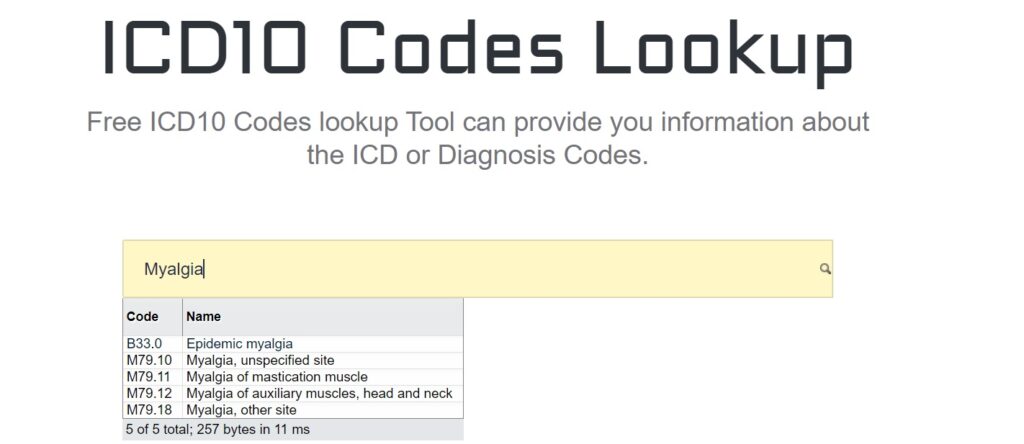ICD 10 Myalgia, also known as muscle pain or myopathy, is a condition that affects millions of people worldwide. It is a common complaint that can be caused by a variety of factors, ranging from overuse or injury to underlying medical conditions. In this article, we will explore the symptoms, causes, and treatment options for ICD 10 Myalgia where ICD stands for International Classification of Disease.
Wrong posture and overworking of the same muscle group can lead to many serious diseases. Most of the athletes and daily wage laborers are victims of such diseases. Changing lifestyle and work pressure has made it even more serious today. Today, in this post, we are going to know in detail about one such health condition, myalgia.
Table of Contents
- ICD 10 Myalgia List
- What is Myalgia ?
- What Causes ICD 10 Myalgia?
- Which Part of the Body Does Myalgia Affect?
- How to protect our self from this Myalgia?
- Difference between Arthralgia and myalgia
- Symptoms of Myalgia
- Conclusion :
- FAQs
- Related Articles:
ICD 10 Myalgia List
Myalgia is muscle pain issue and M79.1 is ICD 10 code use for Myalgia. Other related codes are mentioned as below list.
| ICD Codes List | ICD Description |
| M77.41 | Right foot |
| M77.42 | Left foot |
| M77.5 | Other enthesopathy of foot and ankle |
| M77.50 | Other enthesopathy of unspecified foot and ankle |
| M77.51 | Other enthesopathy of right foot and ankle |
| M77.52 | Other enthesopathy of left foot and ankle |
| M77.8 | Other enthesopathies, not elsewhere classified |
| M77.9 | Enthesopathy, unspecified |
| M79 | Other and unspecified soft tissue disorders, not elsewhere classified |
| M79.0 | Rheumatism, unspecified |
| M79.1 | Myalgia |
| M79.10 | Unspecified site |
| M79.11 | Mastication muscle |
| M79.12 | Auxiliary muscles, head and neck |
| M79.18 | Other site |
| M79.2 | Neuralgia and neuritis, unspecified |
| M79.3 | Panniculitis, unspecified |
| M79.4 | Hypertrophy of (infrapatellar) fat pad |
| M79.5 | Residual foreign body in soft tissue |
| M79.6 | Pain in limb, hand, foot, fingers and toes |
| M79.60 | Pain in limb, unspecified |
What is Myalgia ?
Myalgia refers to the medical conditions of muscle pain or soreness, usually felt as a result of overuse, injury or infection. The pain can be felt as dull ache, sharp stinging sensation or a burning sensation in the affected muscle area. It can also be a symptoms of various medical conditions such as that fibromyalgia, lupus or chronic fatigue syndrome, as well as a side effects of certain medications or drugs. Treatment of myalgia depends on the underlying situation and may include rest, pain relievers, physical therapy, and lifestyle modifications. In some cases, myalgia may also be a sign of more serious underlying condition and should be evaluated by a healthcare professionals.
What Causes ICD 10 Myalgia?
ICD 10 Myalgia can be caused by a variety of factors, including:
- Overuse or injury: Muscle pain and stiffness can be caused by overuse or injury to the muscles. This is a common cause of ICD 10 Myalgia and can be seen in athletes and people who engage in physical labor.
- Infections: Some infections can cause muscle pain and stiffness as a symptom. These include viral infections such as the flu or bacterial infections such as Lyme disease.
- Autoimmune disorders: Autoimmune disorders such as lupus or rheumatoid arthritis can cause muscle pain and stiffness.
- Inherited conditions: Inherited conditions such as muscular dystrophy can cause muscle pain and weakness.
- Medications: Some medications can cause muscle pain and stiffness as a side effect. These include cholesterol-lowering medications and statins.
- Nutritional deficiencies: Nutritional deficiencies such as a lack of vitamin D or magnesium can cause muscle pain and weakness.
● Symptoms of myalgia can occur when we repeatedly or overuse a muscle group, such as those experienced by athletes and blacksmiths.
● Myalgia can also caused by viral infections such as influenza or bacterial infection such as Lyme diseases.
● Additionally, other health conditions such as fibromyalgia, lupus, or polymyalgia rheumatica can cause muscle pain.
● Certain drugs can also cause myalgia flare-ups such as statins used to lower cholesterol or ACE inhibitors used to treat high blood pressure, etc.
● Vitamin D or potassium deficiency in the body can give rise to the symptoms of myalgia.
Which Part of the Body Does Myalgia Affect?
Myalgia is a common symptom associated with many different health conditions. Myalgia can affect any part of your body, from the head and neck to the limbs and back of the body.
Myalgia includes viral infections, fibromyalgia, chronic fatigue syndrome and other autoimmune diseases. It may arise as a side effect of certain medications or due to physical trauma or overuse.

How to protect our self from this Myalgia?
To protect yourself from myalgia it is essential to exercise regularly to strengthen your muscles and reduce your risk of injury. Be sure to stretch before and after exercise to prevent muscle strain, drink plenty of water and practice good posture to prevent muscle imbalances, and avoid overexertion if possible and take breaks during physical activity must take. The most important thing among all this is to get enough sleep to give rest to your muscles.
Difference between Arthralgia and myalgia
● Arthralgia and myalgia are two different types of pain, one in the muscles of the body and the other in the joints.
● Arthralgia is often caused by inflammation or injury to the joints, such as in arthritis or sprains. On the other hand, myalgia is often caused by muscle overuse or stress, viral infections or side effects of certain medications.
●Arthralgia often causes stiffness and reduced range of motion in the affected joint, while myalgia may cause muscle weakness and fatigue to be experienced.
● The treatment of arthralgia and myalgia differs depending on the cause. Treatment options for arthralgia may include pain medication, physical therapy, or joint injections. While the treatment of myalgia includes rest, stretching exercises and pain medication.
Symptoms of Myalgia
Myalgia, commonly known as severe muscle pain, is a major cause of not getting enough sleep. It is very important to know its symptoms for treatment, so let’s know what are its symptoms-
● The most common symptom of myalgia is pain, which can range from mild to severe and may be localized or widespread.
● People with myalgia experience stiffness or tightness in the affected muscles.
● During myalgia, muscle pain can be accompanied by fatigue and weakness, which can make it difficult to perform daily activities.
● In some cases, inflammation of the muscles of people with myalgia has also been observed.
● Myalgia can cause tender points or sensitive areas in the affected muscles, which may be painful to the touch.
Conclusion :
If defined briefly, myalgia is a disease associated with muscle pain, which occurs due to excessive pressure on a single muscle. Myalgia is a medical term that is also used to describe muscle pain or tenderness. We have discussed in detail about the symptoms, causes and ICD 10 myalgia codes in this post. Apart from this, we have also told how to avoid myalgia and what is myalgia. If you have any question related to this topic then you must ask in the comment box.
FAQs
Ans. Myalgia, or muscle pain, can be caused by a variety of factors. Here are five signs that you may be experiencing myalgia:-
1. Muscle soreness or tenderness
2.Stiffness or difficulty moving the affected muscle
3. Fatigue or weakness in the affected muscle
4. Pain that worsens with movement or pressure
5. Limited range of motion in the affected joint or muscle group.
Ans. Myalgia, or muscle pain, can feel different for different people. It may be described as a dull ache, soreness, stiffness, or a burning sensation in the affected muscles . The pain may be localized or spread throughout the body. Some people may also experience muscle weakness, fatigue, or cramping. Myalgia can be caused by various factors, including overuse, injury, infection, or certain medical conditions.
Related Articles:
ICD 10 Code for Secondary Cardiomyopathy



